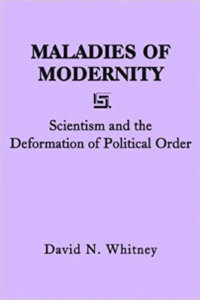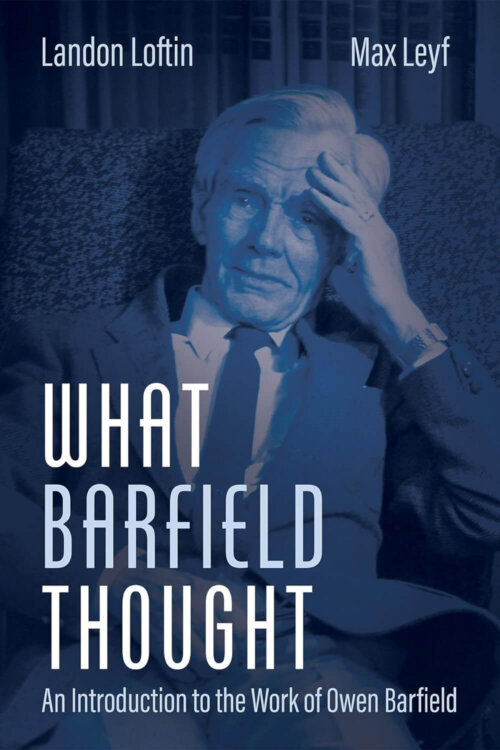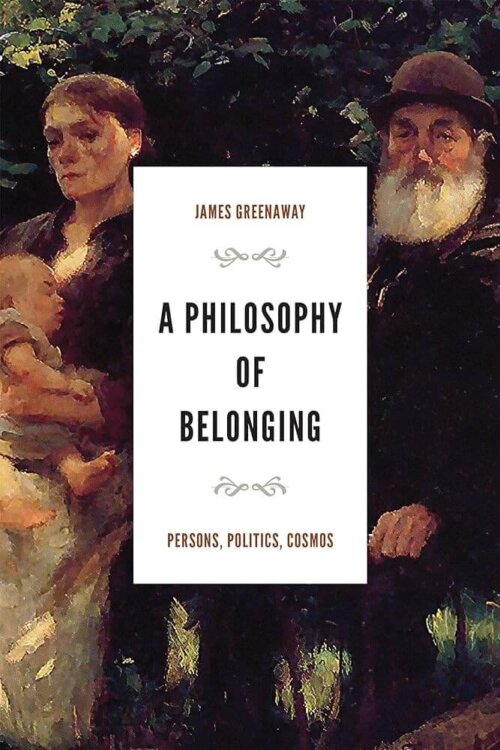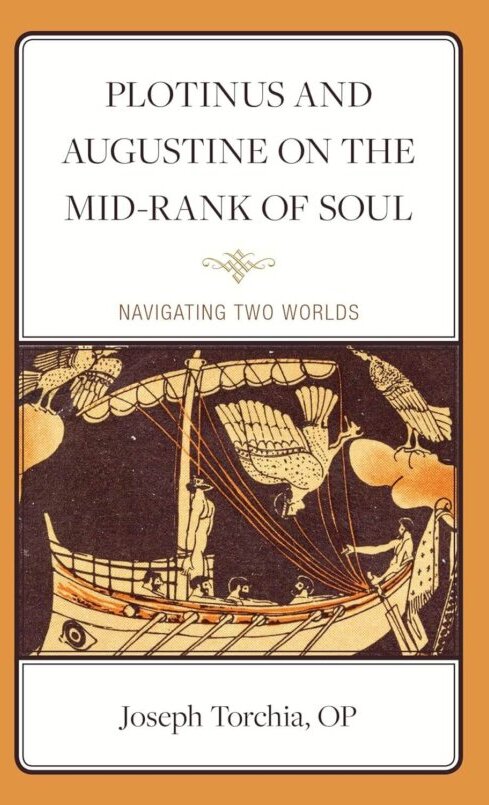Review of Maladies of Modernity: Scientism and the Deformation of Political Order

Maladies of Modernity: Scientism and the Deformation of Political Order. David Whitney. South Bend, IN: St. Augustine Press, 2019.
David Whitney’s excellent critique of what he calls scientism, a dogmatic application of the methods of natural science to social science, provides a high-brow diagnosis of the modern maladies that result from the “rhetorical power of science.” Whitney traces the development of scientism from Bacon’s seminal articulation of the scientific method, through heavy hitters including Newton, Comte, Marx and Darwin, to the then-unquestioned but morally dilapidated consequences of the ideological tendencies of these thinkers: the reliance of the scientific method in 20th century American sterilization laws and in Nazi eugenics. Whitney essentially argues that the scientific method, originally designed for the natural sciences, became increasingly applied to the social sciences without meaningful consideration of the moral differences between experimenting on rocks and on human beings, and that this omission of critical thought – originating innocently but evolving to be an intentional omission – led eventually to the horrific 20th century view that individuals may be put into petri dishes to benefit the collective good. The book concludes by warning that “softer” contemporary scientific pioneering endeavors such as stem-cell and genomic research could be likewise dangerous because of the way in which moral questions pertinent to these experiments are sometimes diminished or ignored because they cannot be answered through the methods employed by so-called “real scientists.” Whitney thereby convincingly supports Eric Voegelin’s well-known contention that the “new science” of modernity is morally inept, and that an even newer social science should be built from the ruins of Aristotelian political science, whereby moral and practical evaluations gain a foothold as credible scientific assertions.
The most interesting aspect of this valuable work is Whitney’s ability to trace the way in which proponents of the scientific method become increasingly radical in their belief that the methods of the natural sciences can be a panacea for all troubles plaguing human affairs, and, likewise, how such proponents become increasingly unwilling to entertain critical questions about whether or not the scientific method can actually produce a social utopia. Whitney argues it is this particular gnostic tendency of scientism that ironically produces the morally horrific outcomes that characterize the dark side – forced sterilizations and death camps – of scientific progress.
Bacon only rhetorically portrays a scientific utopia, Bensalem, in his New Atlantis as a means of narratively advocating for his method of empirical evaluation and experimentation as means of ascertaining generalizations and probabilities. However, following the successful implementation of Bacon’s method in the natural sciences by Isaac Newton, proponents of Bacon’s scientific method slowly transform the new scientific method into “scientism” by developing a religious-like faith in the ability of science to relieve social problems such as violence and suffering.
D’Alembert and Saint-Simon contributed two noteworthy and related innovations integral to the rise and eventual misuse of Bacon’s scientific method. D’Alembert’s error, according to Whitney, is his reduction of philosophy to include those concepts and fields that are consistent with Bacon’s empirically grounded method, and his elimination from the realm of critical inquiry of those concepts and fields that are not so empirically grounded. Prominently, questions pertaining to faith and spiritual insights are eliminated because not easily answered through his preferred method.
Saint-Simon argued for a system of political organization based upon the supremacy of Bacon’s method, leveraging the collective good against individual freedom, he argues for a “Council of Newton,” a council of leaders whose merits include scientific know-how, and who he argued should utilize their scientific acumen to foment real-world relief from social ills through proper social organization. One should note, as Whitney does, that Simon’s accentuation of collective progress as facilitated through political institutions undermines the welfare of the individual when in tension with the collective welfare.
Whitney devotes significant space in this work to analyzing August Comte. With ink well-spilt, Whitney deepens Voegelin’s own relatively terse analysis of Comte in Science, Politics, and Gnosticism. Whitney’s contribution to Voegelinian scholarship is noteworthy, in this chapter perhaps above all others, as he strengthens and supports Voegelin’s concept “the prohibition of questions.” In short, in Comte, who worked for a time as secretary for Saint-Simon, the error of raising method above ends becomes even more radical, and the derailment of science into a pseudo-religious enterprise aimed at worldly rather than spiritual fulfillment becomes evident. Comte openly criticized theology, metaphysics, and the classical philosophers who championed such concepts. Instead, he emphasized positivist training in an educational curriculum limited to positivist subjects such as mathematics, physics, and astronomy. Comte moreover articulated a “religion of Humanism,” whose credibility would be evidenced through the historical manifestation of humane achievements, with the manifestation itself facilitated through the scientific method. By this point in the evolution of scientism, Whitney argues, any semblance of spiritual awareness or what Aristotle would have called the bios theoretikos is missing from the ruins of religion. It is the prioritization of method above contemplation which ultimately opens the door to the philosophical justification of inhumane means to achieve ostensible human progress.
An interesting error is committed by Comte, and repeated by later scientist thinkers. In attempting to utilize a scientific method based upon empirical evidence, Comte speculates about what might ultimately be revealed by the method, while insisting that his speculations are not speculative but empirically observed. As Whitney explains and quotes:
Before outlining the characteristics of such a science, Comte had to first explain why a change was necessary and why the previous modes of exploring social questions were deficient. To do so, he posited a “great fundamental law, to which the mind is subjected by an invariable necessity.”[1] The law of three states (or stages) can be “demonstrated both by reasoned proofs furnished by a knowledge of our mental organization, and by historical verification due to an attentive study of the past.”[2] Comte continues:
“This law consists in the fact that each of our principal conceptions, each branch of our knowledge, passes in succession through three different theoretical states: the theological or fictitious state, the metaphysical or abstract state, and the scientific or positive state. In other words, the human mind—by its very nature—makes use successively in each of its researches of three methods of philosophizing, whose characters are essentially different and even radically opposed to each other. We have first the theological method, then the metaphysical, and finally the positive method. Hence, there are three kinds of philosophy or general systems of conceptions on the aggregate of phenomena, which are mutually exclusive of each other. The first is the necessary starting point of human intelligence; the third represents its fixed and definitive state; the second is destined to serve only as a transitional method.“[3]
It should be noted that the law of the three states is not meant to describe how things should progress, but rather how they must progress. The movement of history dictates that positivism will triumph and Comte is merely the instrument that will bring it about.[4]
As Whitney suggests, Comte’s assertions about how the human mind will behave in its final form is speculative and not empirically grounded because no one knows what the future will entail. It is here that the positivist movement errs greatly by proclaiming that faith is irrelevant and evidence matters, but while resting their suppositions about the achievement of progress solely on faith without evidence:
Assuming Comte is right about the historical progression of the sciences, the question still must be asked whether things should continue to progress in such a way. Is such a progression actually good for humanity? To such questions, Comte tersely replies: “whether this is a good or a bad thing matters little; the general fact cannot be denied, and that is sufficient. We may deplore the fact, but we are unable to destroy it; nor consequently, can we neglect it, on pain of giving ourselves up to illusory speculations.” In other words, certain questions are prohibited when it comes to progress.[5]
Whitney responds by positing that the mere asking of such questions is perhaps essential to the human experience. As I write and contemplate Whitney’s question, it seems to me that, because I am indeed interested in wondering about this question, Whitney must at least be onto something: there is unequivocal human value to the process of wondering and questioning. Whitney follows Voegelin in asserting that the prohibition of such questions in Comte is an intentional and pneumopathological sleight of hand so that his system can be implemented without the nuisance of critical questions that he cannot answer through his own method. A stereotypical pnuemopath, Comte held his convictions with the fervor of a religious zealot (he proclaimed himself “Pope of Humanity”), and the essentials of his intellectual revolution were duplicated in practical form by Marx and his communist revolution.
Although later thinkers like Voegelin and Whitney are critical of Comte’s method, it seems that his contemporaries were taken by his conflation of science and religion, by his speculative presentation of historical evolution, and even further by his authoritative stance toward intellectual opposition. This tendency is perhaps understandable given the political, religious, and social dynamics of late 19th century Europe, but the philosophically confused environment gave rise to destructive historical manifestations. Whitney very convincingly argues that Karl Marx’s political thought is built very fundamentally in its structuring and methodology from the thought of Comte. Whitney summarizes the well-known Voegelinian critique of Marx pertaining to his speculative theory of history and his use of the prohibition of questions.
Perhaps more interesting is Whitney’s ability to draw a cogent connection from the speculative history theories of Comte and Marx to Charles Darwin’s theory of evolution. Although Darwin’s theory of evolution is regarded by many today as being essentially correct, it is the way in which Darwin arrives at his conclusions that troubles Whitney. In the Descent of Man Darwin follows the same method of prohibiting questions as had Comte and Marx. By proclaiming that man’s propensity to wonder about metaphysical issues is irrelevant to man’s essence, Darwin is able to accentuate biological evolution without grappling with what man’s capacity for contemplation might mean for man’s essence:
In addition to man’s mental and physical faculties being reduced to biological and materialistic processes, his moral sense was included. Morality arises because it aids in the struggle for survival: “the origin of the moral sense lies in the social instincts, including sympathy; and these instincts no doubt were primarily gained, as in the case of the lower animals, through natural selection.” Morality then depends not on a set of eternal, immutable natural laws, but on material conditions. A preferable morality is one that maximizes biological survival. If this is the case, then the question of free will and human responsibility becomes paramount. Darwin’s failure to find a differentia specifica essentially means that one cannot judge human action differently from that of animals.[6]
From here, Whitney’s difficult task has been successfully completed, and a powerful critique of the Nazi Eugenics movement and of American sterilization programs in the early 20th century follows. Whitney’s essential argument – that turning science into religion and prohibiting critical analysis of the enterprise creates the propensity to treat men like cattle – is tight and provocative. Although this critique makes for worthwhile reading, Whitney travels into more controversial and timely lands by arguing that these same tendencies can be found in modern-day scientific prerogatives such as stem-cell research and genomic research. I shall not do the reader a disservice by summarizing this portion of Whitney’s book; suffice it to say that a cogent and compelling case is made that a zealous proclivity for scientific progress is still counterproductive to actually achieving progress through science.
Whitney concludes this worthwhile book with some positive prescriptions for a “new science of politics.” Of course, his prescriptions are not “new” to students of Eric Voegelin, and follow closely Voegelin’s preference for Aristotelian methods. If there are limits to Whitney’s analysis, they concern his inability to break from Voegelin. A strong case can be made that this is not a problem. By delving deeper than had Voegelin into texts and ideas that Voegelin himself had analyzed, and by extending this analysis into areas where Voegelin did not go, Whitney is able to support Voegelin’s findings in a meaningful way. The fact that Voegelin’s method can be so readily and accurately applied to contemporary maladies suggests that his method is still empirically tenable. And that, in a clear contrast to the methods employed by the thinkers analyzed by Whitney, is the humble task of science.
Notes
[1] Whitney, Maladies of Modernity, 66.
[2] Ibid.
[3] Ibid.
[4] Ibid.
[5] Ibid., 70.
[6] Ibid., 106.
Kimberly Hurd Hale’s review and an excerpt of the book is available.




